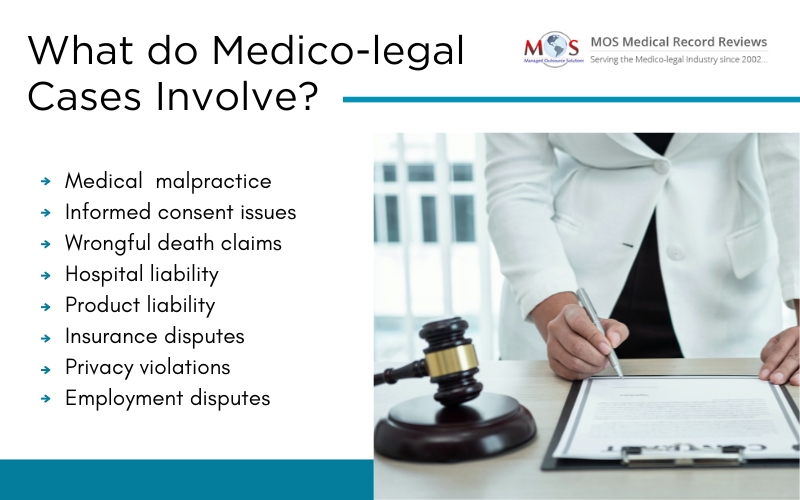Medico-legal cases or medical-legal cases are cases where medical issues intersect with legal considerations, often involving the interpretation and application of laws and regulations in the context of healthcare. These cases arise when a person seeks legal help due to perceived harm, negligence or other issues related to medical treatment or healthcare services.
Medico-legal cases can involve a range of scenarios, including medical malpractice, informed consent issues, wrongful death claims, hospital liability, product liability, insurance disputes, privacy violations, and employment disputes.
Law enforcement agencies investigate and determine responsibility for any injury or medical condition. This involves examining the circumstances surrounding the injury or medical condition to establish legal implications and assign accountability. In such cases, accurate medical record review becomes very important for the assessment and resolution of legal matters related to healthcare.
Medical records provide a comprehensive account of a patient’s medical history, treatments, and interactions with healthcare professionals. Clear examination of these records aids in establishing the standard of care provided, identifying potential instances of negligence or malpractice, and determining causation between medical interventions and adverse outcomes. The thorough review of these records allows legal professionals and medical experts to draw informed conclusions, substantiate claims, or defend against allegations. Additionally, review of medical records also contributes to ensuring transparency, fairness, and the pursuit of justice within the legal framework, emphasizing the critical importance of this process in the resolution of medico-legal cases.
Opt for our medical review services to strengthen your legal perspective!
Legal Terms Relevant to Medico-Legal Cases
Legal terms relevant to medico-legal cases include a wide range of terms specific to the intersection of medical issues and legal considerations.
Here are some key legal terms relevant to medico-legal cases:
- Medical malpractice: Negligence or failure on the part of a healthcare professional to meet the standard of care, which results in harm to a patient.
- Standard of care: The level of care, skill, and diligence that a reasonable healthcare professional would provide in similar circumstances.
- Informed consent: Permission granted by a patient after being informed about the risks, benefits, and alternatives to a medical procedure.
- Causation: The establishment of a direct link between a healthcare provider’s actions (or inactions) and the harm suffered by the patient.
- Damages: The compensation sought by the injured party in a legal action, often monetary, for the harm suffered due to medical negligence.
- Statute of Limitations: The legally defined time within which a lawsuit must be filed after an alleged incident of medical malpractice.
- Res Ipsa Loquitur: A legal doctrine that allows the inference of negligence based on the circumstances of an accident or injury when direct evidence may be lacking.
- Expert witness: A professional with specialized knowledge and experience who is called to testify in court to provide expert opinions in medico-legal cases.
- Privileged communication: Information shared between a patient and healthcare provider that is protected by legal privilege and cannot be disclosed without the patient’s consent.
- Defendant: The party being accused or sued in a legal action; often the healthcare professional or institution facing allegations in a medico-legal case.
- Plaintiff: The party bringing a legal action; typically the patient or the patient’s representative in medico-legal cases.
- Negligence: Failure to exercise the care that a reasonably prudent person in the same circumstances would exercise, leading to harm.
- Arbitration: A legal process for resolving disputes outside of court, often used as an alternative to traditional litigation in medico-legal cases.
- Habeas corpus: A legal action that protects an individual’s right to be free from unlawful detention or imprisonment, occasionally relevant in mental health-related medico-legal cases.
These terms provide a foundation for understanding the legal aspects of medico-legal cases, but it’s important to note that legal terminology can vary based on jurisdiction and specific legal contexts.
While handling such cases, attorneys may also have to deal with large-volume, unorganized medical records from various sources. Medical review solutions provided by professional companies can assist in identifying the medical records relevant to the case and obtaining clear case summaries.
Reliable medical record review services for thorough analysis in medico-legal cases!
Talk to our team at (800) 670-2809!





